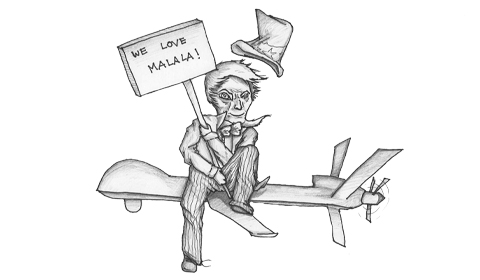
Malala Yousafzai has been embraced by the United States as an advocate whose views about female education coincidentally align with ours and who therefore validates our quest to improve girls’ education worldwide. Yet, while Americans celebrate her bravery against the Taliban, we were far less enthused over her rebuke to Obama that U. S. drone strikes fueled terrorism by increasing anti-American sentiment. And while Americans lamented the fact that Yousafzai was not honored with the Nobel Peace Prize, many Pakistanis expressed concern that her fame had potentially drawn the Taliban’s attention back to the Swat Valley.
Many criticized her rise to prominence as a Western attempt to disparage their country. The contrast between the media fervor surrounding Yousafzai and the lack of attention paid to consequences of drone strikes, as well as the difference between American and Pakistani perceptions of Yousafzai and her cause, demonstrates a dangerous gulf between the manifestation of America’s savior complex and the needs of other societies. Americans cannot seek to improve the conditions of women and girls worldwide while paradoxically ignoring our role in contributing to said conditions. Nor should we seek to appropriate the very real suffering of others to justify our own aims in other countries.
Independent organizations put the number of Pakistani civilians, including the very young and very old, killed by U.S. drone strikes at anywhere between 200 to 400. It is easy to see how such deaths could provide legitimacy to anti-U. S. rhetoric, driving previously neutral civilians into the arms of the Tali- ban, thereby increasing its range and power.
In criticizing drone strikes, Yousafzai reminds the U. S. that we have played a part in the violence committed against her and countless unnamed but no less important Pakistani women. It is not only hypocritical but also counterproductive for Americans to pat themselves on the back for praising Yousafzai with one hand and continue to support drone strikes with the other.
Both Pakistanis and Americans have called America’s shortsighted love for Yousafzai not well-meaning ignorance, but rather a deliberate attack on Pakistani society and a means to justify U.S. military action. In covering the attack on Yousafzai, American media simultaneously ramps up public awareness of the Taliban, advocating the need to go to any lengths to combat them. This is far from the first time women’s rights have been used to justify American intervention.
In 2001, then First Lady Laura Bush called the oppression of Afghani women “a central goal of the terrorists,” proof of the necessity of Operation Enduring Freedom. Using the oppression of women to rationalize intervention is not only disingenuous; it is counterproductive. Intervention has historically proven to increase tensions, thereby worsening the conditions of women and girls.
Just as Afghani women’s rights advocates called for an end to the U.S. presence in their country, Yousafzai is now asking Americans to end the role we have inadvertently played in increasing Taliban violence. The authenticity of American support for Yousafzai and her cause will be revealed in the degree to which we listen.









